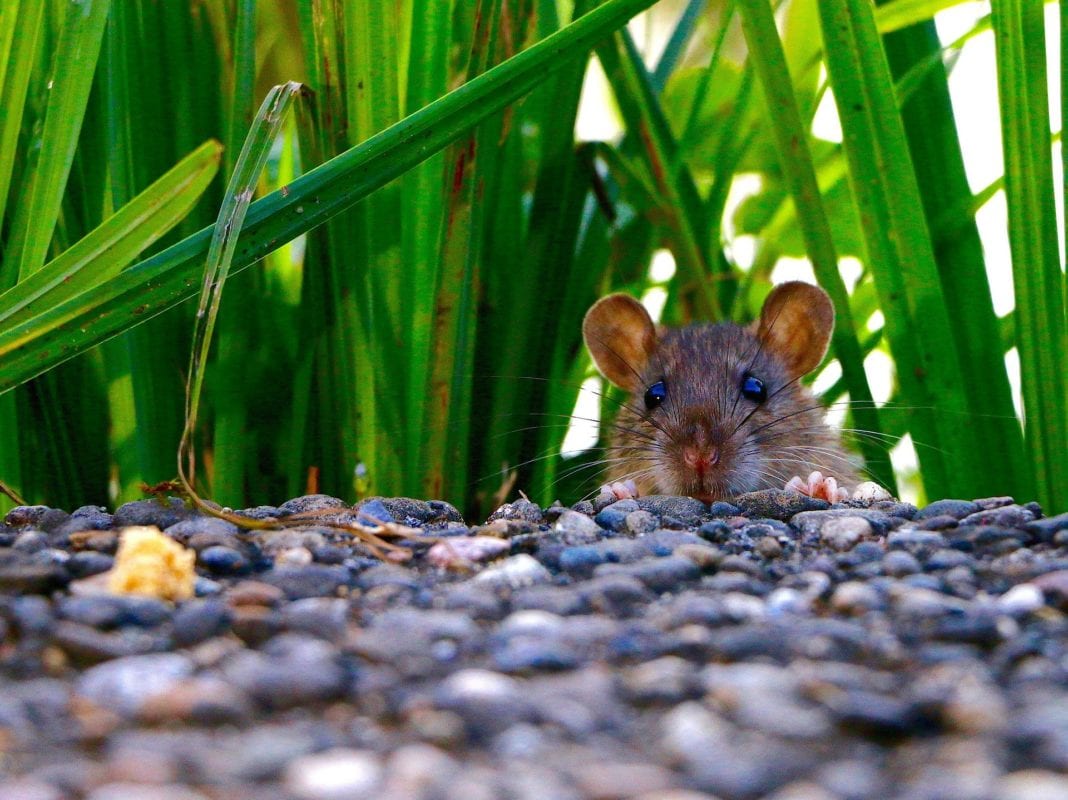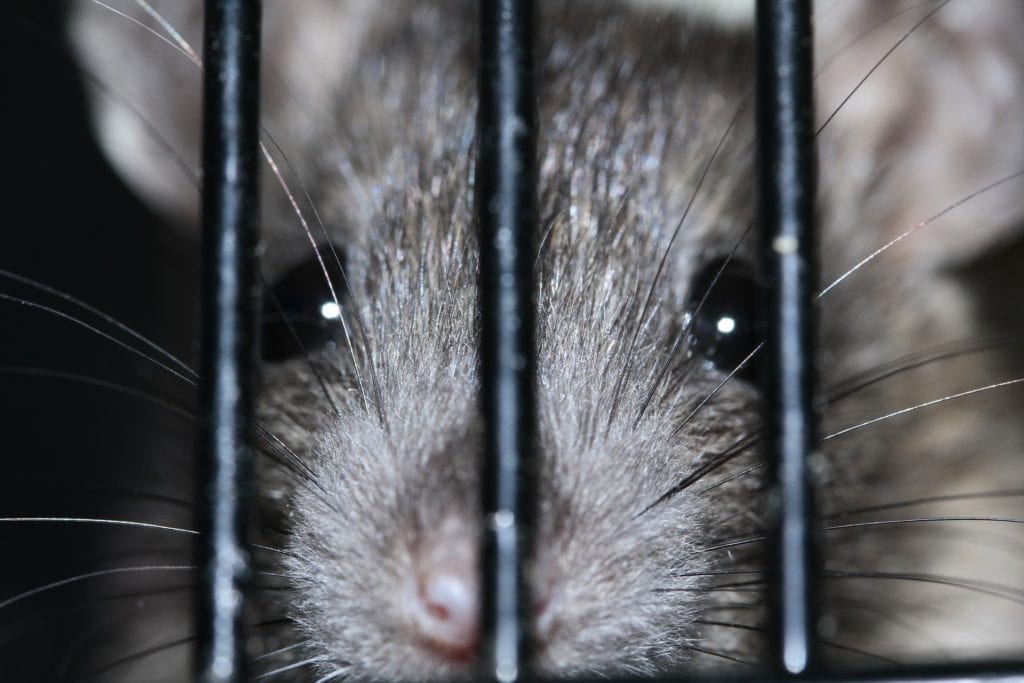
In your garden you want to take time out from the stress of everyday life. You grow plants, devote yourself to gardening and want to relax.
This bliss is quickly over when you discover rats in the garden. The rodents transmit diseases and leave a considerable damage in the garden. They gnaw plants as well as garden tools and if left undisturbed, they multiply rapidly.
If you have found the rats in the garden, you should drive them away as soon as possible. How to do this, you will learn in this guide.
Contents
- 1 How to recognize the rats in the garden?
- 2 Rat droppings
- 3 Paw prints
- 4 Conspicuous smell
- 5 Food traces
- 6 How do the rats get into your garden?
- 7 Is rat infestation reportable?
- 8 Effective means against rats in the garden
- 9 Rat poison
- 10 Traps
- 11 Lethal traps
- 12 bolt trap
- 13 Current trap
- 14 Cats against rats in the garden
- 15 Odors
- 16 Cat litter
- 17 Turpentine
- 18 Odoriferous plants
- 19 Ultrasonic devices
- 20 Prevent the rat infestation
- 21 Create a compost pile correctly
- 22 Dispose of garbage
- 23 Avoid hiding places
- 24 Driving away the rats in the garden
- 25 Author
How to recognize the rats in the garden?
Rats are relatively shy and intelligent animals. Therefore, they do not reveal themselves easily and it might take you a while to even notice that rats are in your garden. To prevent damage and the spread of rats, look for the following signs.
Rat droppings
One of the surest signs of rats in your yard is their droppings. Rat droppings are about 1 to 2 inches long and per day the rat leaves about 40 of them. The droppings are not formed collectively in a pile, but are widely distributed. The rat relieves itself in a wide variety of places and has no preferred place for it.
In terms of color, the rat droppings appear slightly brownish. If it is still shiny, this is a clear sign that the rats are in the area.
Paw prints
In a dusty attic or if you haven’t cleaned the patio yet, small paw prints could be revealed. Rats often follow the same paths and rarely deviate from them. Therefore, you are likely to see a variety of the tracks. The tail also leaves a drag mark, which provides information about the paths the rat takes.
Conspicuous smell
If there is a large number of rats in your garden, it is not left out that some animals die. The dead rats leave behind a strong ammonia odor. This smells similar to urine, but is much higher in intensity. If you notice an unpleasant stench, this could indicate a rat infestation.
Food traces
Rats are not very picky when it comes to finding food. They are considered omnivores and will try to get at food supplies. The feeding marks show up in two grooves created by their incisors.
How do the rats get into your garden?

Most rats live inconspicuously in the sewers. There, the rodents find plenty of food and feed on the food residues that are flushed down the toilet, for example.
If the rats multiply too much and the population increases, there is no longer enough room for the animals in the sewers. They then look for alternatives and open up new living areas.
Gardens and green spaces are among the preferred places. They find plenty of food there and if the garden offers hiding places, the rat feels safe there. They nest and during the winter months they might also find their way into the house.
Rats are attracted to open garbage cans or a compost. The rodents find plenty of food there, so they settle in this place.
Is rat infestation reportable?
Rats were considered carriers of some dangerous diseases even in the Middle Ages. The small rodents are probably responsible for millions of deaths by transmitting the plague, for example.
In Europe, the rat is considered a health pest according to Section 2 (12) of the European Infection Protection Act (IfSG). If you detect a rat infestation in your garden, it is mandatory to report it to the local health office. The health department will give you guidance on how to control the rats and how to proceed.
Regulations vary by state. It may be that the pest control is carried out on behalf of the federal state. Then you do not have to bear the costs yourself. Therefore, inform yourself thoroughly in order not to be stuck with the avoidable costs.
Effective means against rats in the garden
You have discovered the first rats in the garden and want to fight them? Then there are a few methods that can be applied to a rat infestation. Below you will get a selection of control means to drive rats out of the garden.
Rat poison
The first instinct to put an end to the goings-on might be to put out rat poison. You simply apply the poison, wait for the animals to take the bait and the rat infestation will take care of itself.
Rat poison is actually one of the most effective methods. In case of a larger infestation, putting out the rat poison is recommended and proves to be an effective means against rats.
Nevertheless, it should be said that the application is better left to professionals. There are some risks in handling the rat poison, which may expose you or children, as well as pets, to danger. In humans, a lethal effect is unlikely, but you should be aware of the risk.
Some rat poisons are only approved for use by pest control operators. As a private individual, handling is prohibited by law, which is another indication that rat poison should only be used with extreme caution.
Traps
Live traps

With the rat poison you manage to kill the animals. If the infestation in your garden is low and you want to be more animal-friendly, the use of live traps is much better.
You equip the live trap with a bait. Rats love cheese or peanut butter, for example. Set the trap along the rat’s usual routes. At first, the animal will still be shy. But with patience, the rat will get used to the trap and be attracted to the bait.
Once triggered, set the rat far away from your own garden. Pick a spot far from residential areas where the rat cannot do any damage. Then you can get away without killing the animal and have effectively driven the rats away.
Lethal traps
Setting live traps involves some effort. Not only do you have to lure the animal into the trap, but then release it in a suitable place.
If there are several rats in your garden, the use of lethal traps involves less effort. After the successful application, all you have to do is dispose of the rats. There are different types of traps that you can set against the rodents.
bolt trap
An effective and quick method to kill the rats is to set bolt traps. In this, a bait is placed, which attracts the rat. If the animal gets close, a bolt is triggered and the impact effect on the head immediately kills the rodent. Afterwards, set up the trap again so that it can be used again.
The other rats might lurk the danger and not approach the trap again. Therefore, it is advisable to make slight changes visually and change the location after successful use. In this way, the remaining animals will also be attracted to the trap and killed.
Current trap
A current trap looks outwardly like an inconspicuous box. Thus, it could also be mistaken for a bait station or a live trap.
The rat is lured into the box by an attractant. There, a strong electric shock ensures immediate death. The advantage of these traps is their high reliability. The animal dies immediately without suffering any agony. After cleaning the box, it can be used again, so you can effectively control the plague of rats.
Cats against rats in the garden

In rural areas cats are part of the normal picture. They move freely and follow their natural hunting instincts.
In the garden, you can rely on this natural enemy of the rat. In order for cats to effectively drive away rats, you should pay attention to the character of the animal. Highly bred pedigree cats are often less suitable for hunting. They are considered pets and hardly pose a threat to the rats.
It is better to look at a farm nearby. Often these own cats themselves and are not averse to giving away kittens from the next litter. These animals often still have hunting rats in their blood, so rats can be deterred.
Even the sight of harmless house cats could cause rats to leave your garden. Thus, it is also worth a try to let your own pet in the garden to drive away the rats in the garden.
Odors
Rats have a sensitive sense of smell. This helps them to detect food sources from a greater distance. Enemies can also be located by smell, so the rat does not expose itself to danger.
Cat litter
Do you not own a cat, but there are some cat lovers in the neighborhood? Then you can use used cat litter to drive away the rats. The cat litter signals the presence of the natural enemy, which is why the rat will no longer visit your garden and will settle in another place.
Turpentine
Turpentine is also particularly odorous. This you drip on a rag and place it near the rat’s burrow. The turpentine is effective if you know approximately where the rats are. If the rats notice the smell, they will quickly run away and will no longer visit your house and garden.
Odoriferous plants
Some plants emit essential oils that are useful for repelling a variety of pests. Aphids, for instance, can be put to flight. Rats also don’t like the essential oils, so they will stay away from your garden.
You can either grow the plants in the garden or selectively distribute the leaves. It is important that the smell spreads and covers the entire garden area if possible.
The following species are suitable for controlling rats in the garden:
- Fennel
- Lavender
- Mint
- Oleander
- Chamomile
- Clove
- Chili against rats
Similar to essential oils, rats in the garden are also extremely sensitive to spicy powder. Here, the smell is only a minor issue. It is more about the fact that the rat touches the powder and is driven away from the pain that arises.
Sprinkle the powder near the paths of the rat and it will run over it. From the feet, the powder spreads all over the body and enters the mouth. The sharpness turns out to be painful for the rat, so it will avoid your garden.
Ultrasonic devices
High frequencies are no longer audible to humans, but are easily perceived by rats and other rodents. Therefore, there are some devices that emit a loud sound at the high frequency. This is not audible to the human ear and therefore does not pose a threat.
Similar to an ultrasonic device against martens, the sound is also effective against rats. In some cases, the devices are combined with vibrations to achieve greater effectiveness. It also proves useful against voles or moles. Apply the ultrasonic devices to protect your garden from a variety of pests.
Prevent the rat infestation
If you sight the first rats, you should start controlling them immediately. It is even better if the pests do not enter your garden in the first place. Take appropriate measures to prevent a rat infestation.
Create a compost pile correctly
If you create a compost pile in your garden, it could attract the migratory rats. Food scraps and meat scraps are especially attractive to rats.
Do not dispose of kitchen scraps in the compost. The compost is only for vegetable scraps and is not a place for your food waste.
Design the compost so that rats do not have free access. Hiding places and loopholes should also be avoided in close proximity. Place the wooden composter in an open location and feed only the vegetable scraps. Then the compost pile will be less attractive to the migratory rate.
Dispose of garbage
Do you temporarily store food scraps or garbage outdoors? Then the smell is extremely tempting for the rats. It is better to use closed garbage cans and do not leave food scraps lying around in the open. Then there is less risk of rats being attracted and setting up a new place to live in your yard.
Avoid hiding places
Also pay attention to the structural features of your house and garden. If there are some hiding places and loopholes, you should urgently eliminate them. In a neat and tidy garden, rats will hardly find suitable hiding places. On the other hand, if the garden is slightly overgrown or natural, it offers more opportunities for the rats to settle there unnoticed.
Driving away the rats in the garden
Rats are among the most dangerous pests in your garden. They can transmit diseases and eat all food and containers. The pests also do not stop at cables, so that electrical devices give up their ghost.
The methods presented here should drive away rats and ensure that they no longer visit your garden. Above all, make sure that you do not leave any food lying around in the open. If the rats do not find food sources, they will withdraw from your garden and the rat plague will have solved itself.

